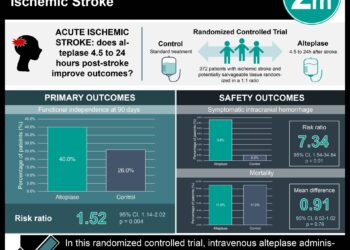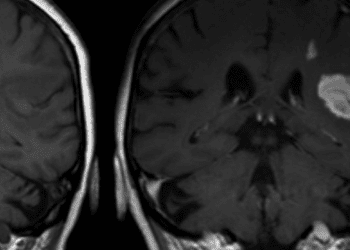Arterial recanalization may not indicate reperfusion in ischemic stroke
1. In a prospective study of 178 patients with ischemic stroke, complete reperfusion was seen in less than two thirds of patients with complete recanalization on computed tomography angiography.
2. Predictors of complete reperfusion were lower stroke severity score, lower clot burden, distal thrombus location, and small infarct and ischemic area.
Evidence Rating Level: 2 (Good)
Study Rundown: A key principle in the treatment of ischemic stroke is timely intervention with fibrinolytics or endovascular therapy to re-establish patency of the cerebral arterial vessels (recanalization) and subsequently re-establish flow to the ischemic region, termed reperfusion. However, the relationship between arterial recanalization and reperfusion is unclear and many previous studies have used these terms interchangeably. Therefore, the purpose of this article was to evaluate the relationship between brain recanalization and reperfusion in patients with known ischemic strokes. The authors prospectively followed over 170 patients with middle cerebral artery ischemic strokes confirmed on admission CT scan. Subsequent recanalization and reperfusion was established on the third day following treatment by CT angiography (CTA) and CT perfusion imaging (CTP), respectively. At the conclusion of the study, only 60% of patients that demonstrated complete recanalization on CTA demonstrated complete reperfusion on CTP, with the discrepancy thought to be due to distal showering of thrombus fragments. Clinical variables associated with complete reperfusion were decreased stroke severity (NIHISS score), smaller infarct size and area, lower clot burden, and distal thrombus location. The results of this study support the hypothesis that although brain recanalization and reperfusion are highly associated, they are not equivalent in patients with ischemic stroke. However, the study is limited by the relatively small sample size and the use of a qualitative rating scale for recanalization and reperfusion. Furthermore, the majority of neurons die early in the ischemic process, thus the use of post-stroke day 3 may not capture the clinically relevant recanalization that result in neuronal reperfusion.
Click to read the study in AJNR
Relevant Reading: Reperfusion is a more accurate predictor of follow-up infarct volume than recanalization: a proof of concept using CT in acute ischemic stroke patients.
In-Depth [prospective cohort]: The study prospectively analyzed a cohort from the Dutch Acute Stroke Study (DUST), a large multicenter cohort trial. Overall, 178 patients with a perfusion deficit in the MCA territory on admission CTP were included between 2009 and 2012. Follow-up CTA and CTP imaging was conducted on post-admission day 3. Exclusion criteria included patients with renal failure or contraindications to contrast agents. Qualitative analysis of admission and follow-up CTA and CTP was performed to determine recanalization and reperfusion status. At the conclusion of the trial, only 50 of the 152 (60%) patients that demonstrated complete recanalization on CTA had complete reperfusion on follow-up CTP analysis. Clinical features that were predictive of complete reperfusion were NIHSS score (OR: 1.06; p < 0.03; 95%CI: 1.01-1.11), small infarct size (OR: 2.40; p = 0.02; 95%CI: 1.14-5.02), smaller ischemic area (OR: 2.35; p = 0.02; 95%CI: 1.12-4.91), clot burden score (OR: 1.35; p = 0.001; 95%CI: 1.14-1.58), and adequate collateral circulation (OR: 2.84; 95%CI: 1.34-6.02; p = 0.01). In multivariate analysis, only total ischemic area was an independent predictor of complete reperfusion.
Image: CC/Wikimedia Commons/Blausen
©2015 2 Minute Medicine, Inc. All rights reserved. No works may be reproduced without expressed written consent from 2 Minute Medicine, Inc. Inquire about licensing here. No article should be construed as medical advice and is not intended as such by the authors or by 2 Minute Medicine, Inc.









